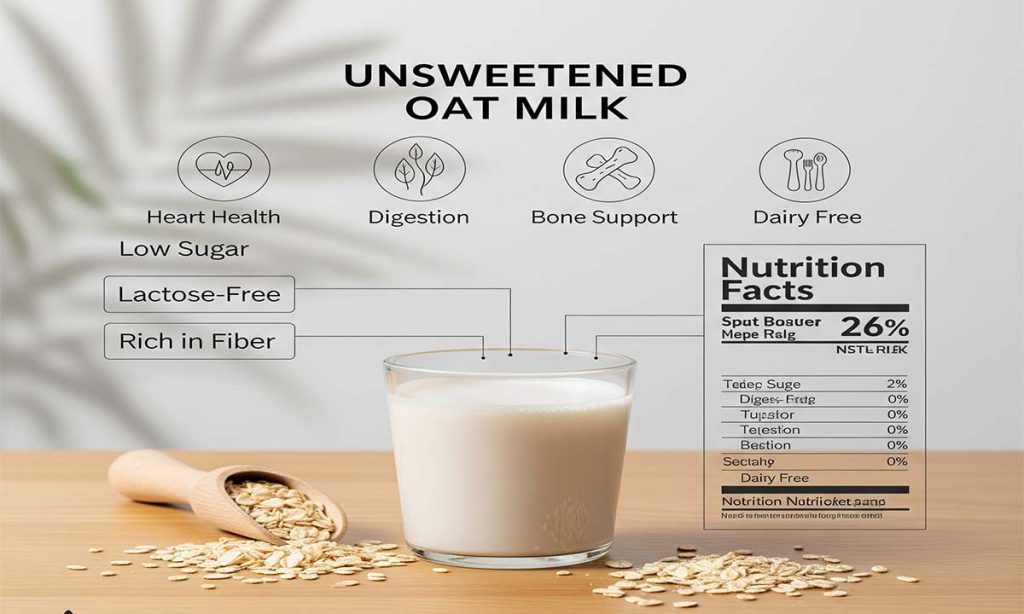Glass jar of creamy unsweetened oat milk with a bowl of whole oats. Unsweetened oat milk is a popular plant-based alternative to dairy made simply from oats and water. It’s naturally vegan and free of lactose, nuts, and soy. Unlike sweetened varieties, unsweetened oat milk has no added sugars, making it a healthier choice for calorie-conscious or diabetic diets. In this guide, we’ll explore 4 key benefits of unsweetened oat milk, examine its nutrition profile (including calories and glycemic index), and discuss potential drawbacks. Whether you’re asking “Is unsweetened oat milk good for you?” or looking up “unsweetened oat milk nutrition,” this article provides expert-backed insights.

Table of Contents
Key Benefits of Unsweetened Oat Milk
1. Heart-Healthy Fiber (Beta-Glucan)
Unsweetened oat milk is rich in soluble fiber, especially beta-glucan, which is known to support heart health. Beta-glucan forms a gel in the gut that can bind to cholesterol and reduce its absorption. Clinical studies show that drinking oat milk (or oat products) can lower total and LDL (“bad”) cholesterol levels over time. For example, health experts note that oat-derived beta-glucan may reduce LDL cholesterol by several percent with daily consumption. In practical terms, substituting unsweetened oat milk for higher-fat dairy milks can contribute to better cholesterol levels. Additionally, oats have a relatively low oxalate content compared to nut milks, so unsweetened oat milk is a safer option for people prone to kidney stones. Overall, the fiber in oat milk helps maintain digestive regularity and promotes a healthy gut microbiome.
2. Lactose-Free and Allergy-Friendly
Because it’s made only from oats and water, unsweetened oat milk is naturally lactose-free and vegan. This makes it an excellent choice for people with lactose intolerance or dairy allergies, as well as for vegans and vegetarians. Dairy milk contains the sugar lactose, which can cause digestive upset in many adults. In contrast, oat milk has zero lactose and no animal ingredients. It’s also nut-free and soy-free, so it’s suitable for those with nut or soy allergies. In short, unsweetened oat milk provides all the creamy texture of milk without the common allergens. It can be used in recipes that traditionally call for dairy, making it a versatile plant-based milk substitute.
3. Good Source of Fiber and (Fortified) Nutrients
Even without added sugar, oat milk supplies dietary fiber that supports digestion. One cup (8 oz) of unsweetened oat milk provides about 1–2 grams of fiber. This fiber content is higher than most nut milks (like almond milk). Fiber helps keep you full and feeds beneficial gut bacteria. Nutritionally, plain oat milk is moderate in calories and carbs, but low in protein. A typical serving has around 100 calories and roughly 6–12 grams of carbohydrates (including natural starch). Notably, most commercial oat milks are fortified with vitamins and minerals. Popular brands add calcium, vitamin D, vitamin B12, riboflavin (B2), and sometimes vitamin A and potassium. This means unsweetened oat milk can help “fill in” nutrients often lacking in plant-based diets. For example, one cup of fortified oat milk may provide 20–50% of the Daily Value for calcium and key B vitamins. If you rely on oat milk daily, choosing a fortified unsweetened variety can be an easy way to boost your intake of B12, calcium, vitamin D, and other micronutrients.
4. Environmentally Sustainable
Switching to plant milks like oat milk generally has a positive environmental impact. Oats require far less water and land to grow than dairy cattle, and oat milk production emits far fewer greenhouse gases than cow’s milk. In one comparison, oat milk’s carbon footprint is only a fraction of dairy’s – using roughly 29% of the land and 1.3% of the water required for cow’s milk. Life-cycle studies find that oat milk and soy milk both generate significantly lower CO₂ emissions than cow milk. So, unsweetened oat milk is an eco-friendly choice: you still get a creamy milk without supporting intensive livestock farming. Many consumers choose oat milk for its taste and its green credentials.
Nutrition Facts of Unsweetened Oat Milk
Unsweetened oat milk is moderate in calories and carbohydrates, and relatively low in protein. The exact values vary by brand, but typical nutrition per 1 cup (240 ml) is roughly:
- Calories: ~96–108 kcal.
- Carbohydrates: ~10–12 g (mostly natural starch).
- Fiber: ~1.5–2 g (beta-glucan fiber).
- Protein: ~1.5–2 g (low).
- Fat: ~5–6 g (mostly unsaturated fats).
- Sugar: ~0–1 g (no added sugar; only trace naturally occurring).
- Calcium: Often ~120–350 mg (when fortified).
- Vitamins: Check label – many brands add vitamins D, B12, A, etc.
For comparison, 1 cup of cow’s milk has about 150 calories, 8g protein, and lower carbohydrates. So oat milk is lower in calories and protein than dairy, but higher in fiber. One important stat: unsweetened oat milk provides roughly 80–100 calories per cup, largely from its carbohydrate content. Because it has no added sweeteners, the “total sugars” listed on the nutrition label of unsweetened oat milk is minimal (often <1g). This is why it is labeled “unsweetened.” Many people are surprised that oat milk is higher in carbs than nut milks (e.g. almond milk has only ~2–3 g carbs per cup). The extra carbohydrates in oat milk come from natural oat starches and fiber.
Regarding the glycemic impact, oats do contain fast-acting sugars (maltose) so oat milk has a moderate glycemic index. Research indicates oat milk’s GI is around 61–62 (medium on the scale). This means it can raise blood sugar moderately. In practice, this is usually not a problem in small amounts: the glycemic load per serving is quite low (about 4–9), because you typically consume only ~100 kcal at a time. Importantly, unsweetened oat milk avoids the spikes caused by added sugar. In fact, experts advise that choosing unsweetened varieties will keep the glycemic effect lower than with sweetened or flavored milks.
Creative Ways to Use Unsweetened Oat Milk
Unsweetened oat milk can replace dairy milk in almost any recipe or drink. Its thick, creamy consistency and neutral taste make it very versatile. Here are some popular uses:
- Coffee and Lattes: Unsweetened oat milk froths well and adds creaminess to coffee drinks without making them sweet. It’s a barista favorite for café lattes and cappuccinos.
- Smoothies & Shakes: Use oat milk as a base in smoothies to boost fiber. It blends smoothly with fruits, greens, or protein powders.
- Cereal & Oatmeal: Pour oat milk over breakfast cereals or use it to cook oatmeal. The texture is richer than almond or soy milk.
- Baking & Cooking: Substitute oat milk 1:1 for cow’s milk in recipes (cakes, pancakes, muffins, sauces). Its mild flavor works in both sweet and savory dishes.
- Hot Chocolate & Pudding: Make hot cocoa or pudding with oat milk for extra creaminess. The unsweetened version lets you control the sugar content.
- Creamer for Tea: Some brands sell unsweetened oat milk creamer specifically for coffee and tea. For example, Elmhurst’s Unsweetened Oat Creamer (made only with oats and water) has just 15 calories and <1g sugar per serving, yet yields a silky coffee.
- Chilled and on its Own: Many people enjoy drinking oat milk straight from the glass as a snack or with cookies.
When using oat milk, remember it may thicken in recipes more than thinner milks (like rice milk), so adjust consistency if needed. Overall, unsweetened oat milk can be a one-to-one swap for dairy in most uses, making it easy to enjoy its benefits.
How to Choose the Best Unsweetened Oat Milk
With more brands on the market, picking a quality unsweetened oat milk is easier than ever. Here are some tips:
- Check the Ingredients: The cleanest oat milks list very few ingredients – typically just oats and water (plus maybe salt or a vitamin mix). Avoid products with added oils, gums, or excessive additives if you want a “pure” oat drink.
- Go for Organic: If possible, choose organic unsweetened oat milk made from organic oats. Organic options minimize exposure to pesticides. (Many common brands now offer USDA Organic oat milks.)
- Look for Fortification: If you rely on oat milk for nutrients, pick brands fortified with calcium, vitamin D, and B12. The Nutrition Facts label should list these added nutrients (often at 20%–50% of daily needs). For example, Oatly’s fortified oat milk provides about 50% DV of B12 and calcium per cup.
- Brand Reputation: Some popular unsweetened oat milks include Oatly (Original Unsweetened), Elmhurst (Unsweetened Milked Oats), Planet Oat (Unsweetened Barista Blend), Chobani (Plain Unsweetened Oat Milk), Califia (Oat Barista Blend Unsweetened), and Silk or Simple Truth (unsweetened versions). These brands have wide availability and mostly clean labels. Try a couple to see which taste and texture you prefer.
- Flavor Options: If you like a hint of flavor without sugar, look for unsweetened vanilla oat milk. This is typically just oat milk with natural vanilla extract, not sugar. It gives a vanilla aroma without added calories.
- Check the Calories: Most unsweetened oat milks range from about 100–120 calories per cup. Elmhurst’s Unsweetened Oat Creamer is an outlier at ~15 cal per serving, but it is a concentrated creamer. In general, the label will show “Unsweetened” and list total sugars as 0g.
- Try a Barista Blend: If you want to use oat milk in coffee, consider a barista edition (unsweetened). These are formulated to froth and often contain a bit of added fat (like a touch of canola oil) for creaminess without sweetness. Planet Oat and Califia both make unsweetened barista-style oat milks.
Ultimately, the “best” unsweetened oat milk depends on your taste and dietary goals. For the purest choice, one of our favorites is Elmhurst’s Unsweetened Oat Creamer (simple ingredients, just 15 calories). If you want a thicker milk for cereal or baking, Oatly or Chobani’s plain unsweetened work well.
Potential Risks and Drawbacks
While unsweetened oat milk has many positives, there are some considerations:
- Higher in Carbohydrates: Oat milk contains more carbs than other plant milks. One cup has about 10–12 g carbs (mostly starch). These carbs can raise blood sugar faster than low-carb milks like almond or coconut milk. Oat milk actually contains maltose (a sugar with very high GI ~105) formed during processing. As a result, blood sugar can spike more after drinking oat milk than after almond milk. People with diabetes or insulin resistance should note this. However, because oat milk has fiber and no added sugar, its overall glycemic load is still relatively low. Drinking unsweetened oat milk in moderation (especially with a meal) is generally fine for most people. If you follow a strict low-carb or keto diet, you may prefer very low-carb options instead.
- Low Protein: Unsweetened oat milk has far less protein than cow’s milk (about 1–2 g vs ~8 g per cup). It also has less protein than soy or pea milk. This means oat milk is less satiating and may not be ideal as a main protein source. If you rely on oat milk for nutrition, be sure to include other protein foods in your diet (legumes, eggs, meat, etc.).
- Gluten Contamination: Oats themselves are gluten-free, but many are processed in facilities with wheat, barley, or rye. Unsweetened oat milk is not automatically gluten-free unless labeled so. People with celiac disease or severe gluten intolerance should look for oat milk that is explicitly certified gluten-free.
- Anti-Nutrients: Like all oats, oat milk contains phytic acid. Phytates can bind minerals like iron and zinc, reducing their absorption slightly. For most people eating a balanced diet, this isn’t a major issue. But if you rely heavily on oat milk and have marginal mineral status, it’s something to consider.
- Additives: Some unsweetened oat milks contain added oils (to improve mouthfeel) or gums (for texture). These are not harmful for most people, but if you prefer a minimal ingredient list, check the label. The purest versions (Elmhurst, New Barn, or homemade oat milk) have only oats and water (and perhaps salt and vitamins).
- Cost: Oat milk is generally more expensive than cow’s milk or almond milk. If budget is a concern, homemade oat milk is an option (see our tips below).
In summary, unsweetened oat milk is safe and healthful for most people, but it should be consumed as part of a balanced diet. Those watching carbohydrates or requiring more protein may need to plan accordingly.
FAQs about Unsweetened Oat Milk
Q: Is unsweetened oat milk good for you?
A: Yes, unsweetened oat milk can be a healthy part of your diet. It is plant-based, dairy-free, and rich in heart-healthy fiber. Because it contains no added sugars, it avoids the calorie and blood sugar spikes associated with sweetened milks. Fortified versions also supply vitamins (B12, D, etc.) and minerals (calcium) that support bone and metabolic health. Nutrition experts note that oat milk is especially beneficial for those who cannot consume dairy, providing nutrients and fiber in an alternative milk. As with any food, moderation is key: check serving sizes and balance with protein sources elsewhere.
Q: How many calories does unsweetened oat milk have?
A: Approximately 90–110 calories per 8-ounce (240 mL) cup. The exact number depends on the brand. For example, USDA data indicate about 96 calories per cup for plain unsweetened oat milk. Most of these calories come from carbohydrates (around 10–12 g), with about 4–6 g of fat and 1–2 g of protein. This calorie level is lower than whole cow’s milk (150 cal) but higher than almond milk (~30 cal) per cup. Because it has no added sugars, the “Total Sugars” on the label of unsweetened oat milk is typically 0–1 g. If calories are a concern, look for brands labeled “light” or try diluting it with water in recipes.
Q: Does unsweetened oat milk spike blood sugar? What is its glycemic index?
A: Unsweetened oat milk has a moderate glycemic index (~60–65). This is similar to foods like couscous or muesli. Its glycemic load is low (a small serving won’t spike blood sugar too much). However, oat milk does contain quickly digestible starches and maltose, which can raise glucose more than, say, almond milk. For people with diabetes, portion control is wise. The good news is unsweetened oat milk has no added sugar, so it’s a better choice than sweetened alternatives. In fact, experts advise preferring unsweetened oat milk to minimize sugar intake. If blood sugar is a big concern, pairing oat milk with protein or fiber (e.g. in a smoothie) can further blunt any glucose rise.
Q: What are some popular brands of unsweetened oat milk?
A: Many brands offer unsweetened versions. Some well-known options include Oatly Original Unsweetened (the classic Swedish oat drink), Elmhurst Milked Oats (unsweetened), Chobani Plain Unsweetened Oat Milk, Planet Oat Unsweetened (barista-style or original), Califia Farms Oat Barista Blend Unsweetened, and store brands like Silk or Simple Truth Unsweetened Oat Milk. You’ll also find unsweetened vanilla oat milks – these contain natural vanilla flavor but no sugar (e.g., Elmhurst Vanilla Unsweetened, Silk Vanilla Unsweetened). Try a few to see which taste and thickness you prefer. Check their nutrition labels (for calories and fortification) to find one that fits your needs.
Q: Is organic unsweetened oat milk better?
A: Choosing an organic unsweetened oat milk can reduce exposure to synthetic pesticides since the oats are organically grown. Nutritionally, organic vs. non-organic oat milk is very similar. However, if you’re concerned about the environmental impact of farming, organic is a plus. Also look for “certified gluten-free” on organic oat milks if you have gluten sensitivity. Overall, organic unsweetened oat milk is a slightly “cleaner” choice, but both organic and conventional unsweetened oat milks provide the same core benefits of fiber and dairy-free nutrition.
Q: Is unsweetened oat milk a good coffee creamer?
A: Absolutely. Unsweetened oat milk creamer is popular in coffee shops. It froths nicely and adds a creamy texture. For example, Elmhurst’s Unsweetened Oat Creamer is made only with whole oats and water, and contains just 15 calories per serving. Planet Oat and Califia also make unsweetened “barista” oat milks formulated for coffee. Using an unsweetened creamer lets you enjoy coffee without extra sugar or calories. It’s also excellent in tea, lattes, and matcha. Just remember, barista-style oat milks may list a bit of added oil (for texture) but still no sugar.
Conclusion
Unsweetened oat milk is a nutritious, low-allergen milk alternative that offers heart-healthy fiber and plant-based nutrients with none of the added sugars in sweetened milks. It’s naturally lactose-free and vegan, making it suitable for almost any diet. When fortified, unsweetened oat milk also contributes important vitamins and minerals (like B12 and calcium) to your diet. Be mindful that it is higher in carbohydrates than nut milks, so people managing blood sugar or following low-carb diets should consume it in moderation. For most others, the benefits – including cholesterol-lowering fiber and environmental sustainability – make unsweetened oat milk a smart choice.
Ready to give unsweetened oat milk a try? Start by picking one from your grocery’s plant milk aisle – for example, look for “Oatly Unsweetened,” “Elmhurst Unsweetened Milked Oats,” or “Planet Oat Unsweetened”. You can use it exactly like dairy milk in your coffee, cereal, smoothies, or cooking. And remember to choose fortified versions if you want extra vitamins.
If you found this guide helpful, please share it with friends and comment below with your favorite ways to enjoy unsweetened oat milk. We’d love to hear if you have a favorite brand or recipe!
Sources: Reputable nutrition and health sites were used to compile these insights.





4 thoughts on “Unsweetened Oat Milk: 4 Benefits, Plus Nutrition & Risks”